
[CLIMATIC ROOT TREATMENT] is a series of blogposts seeking to uncover and understand the deeper roots of society’s problems with taking appropriate action on the climate emergency, and to explore the advantages we could see once the action sets in.
“The [fossil fuel] industry thinks we are all fools, so all I can say is dig deep, find the facts, knowledge is power.”
~ Damian Marchant from Frack Free Moriac
“We Australians like to live an easy life,” someone told me. “That’s why we cut our names short, and we love our motor vehicles.”
Having lived in Australia almost four years now, I have learned during that time that there is more to it than that. There is another side to the “easy life”-attitude, and that is the culture of cutting corners. Skip the easy way. Make shortcuts when no one sees it. An attitude that cheating is actually okay, even celebrated and cherished if no one discovers it.
It appears to be deeply rooted in how things are done around here, and I sometimes wonder if this observation also delivers a brick of the puzzle, which remains a real mystery to me: why so many Australians not only accept but even support the current inaction on climate change at federal policy level. Why they buy into the lies politicians tell them on tv, in particular during election periods. And why only a tiny minority in this country shows any interest in living more sustainably, even when doing that saves you money.
The following are some of my observations and thoughts on the matter. I’m not claiming to be an expert on Australian culture, and I might be getting it all wrong. You tell me! The comments-field is open at the bottom of the page.
What I argue in this blogpost is that Australia has a problem with so-called ‘mistruths’, dishonesty and making shortcuts – and that this problem creates a slippery slope which goes much deeper than what it may seem at first. It causes mistrust and blocks collaboration.
Cutting corners and openly cheating appears to have become an accepted norm, tolerated as an ‘annoying but standard procedure’. My point is that unless we begin to directly address this flawed attitude, we are not likely to see the kind of changes which Australia so badly needs in its renewable energy sector, and in its efforts to tackle the climate change crisis.
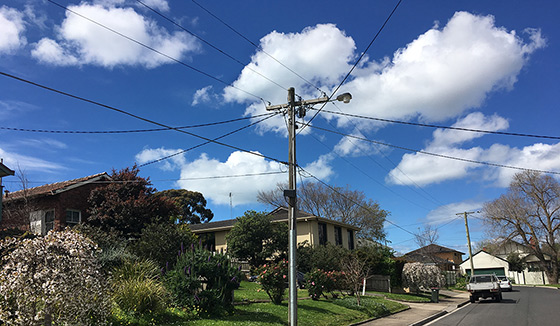
I’m not sure how far this cut-corners-when-you-can culture goes back, but as a newly arrived in the country you can’t overlook and wonder, for instance, why the streets are so ‘visually polluted’ with an ugly and dangerous criss-cross web of electricity and phone wires. Later on you might realise that this is a result of that some department in the city’s council at some point figured that rather than paying the extra it costs to dig the wires in the ground, as it is done in modern cities all over the world, it would be easier to cut a corner here and just leave them hanging. Lots of maintenance costs on the long term, but on the short term: a cheaper choice.
Same with the missing bike path infrastructure: “Hm, yes, it would probably have been a good thing to have, but then again, it would have been an extra cost to the rate payers.” So instead we just run some white paint out on the asphalt and call it a ‘bike path’. A lot cheaper, of course, but sadly, it is actually more of a death trap for the cyclists than a protection.
There’s the way that family houses are built here – with single glass windows, wooden walls without insulation, resulting in freezing indoor temperatures which require excess use of wood, gas or electricity to heat the place. A short-termed cost-cutting exercise in the building phase ends up becoming a huge extra expense in the long run to the house owner – but ‘to hell with heating/cooling costs and carbon footprints’, according to the Australian building tradition, and only very slowly, little by little, is that attitude now beginning to change.
It is a culture of ‘if you can get away with it, then just do it’ – and: ‘if you get cheated, it was probably your own fault’ – an attitude which generally results in low levels of trust and many resources used on control measures – not the least among professionals and tradies, and in particular in the real estate and building sector.
Let me give you a couple of quick examples from where I live, which at first may seem like they have nothing to do with climate safety – the general theme of this blog – but what I am asking here is whether at a deeper level there is some sort of a connection we need to understand and be aware of? Along the route I am probably likely to stumble over a couple of taboos and sore spots, for which I will be critisised – and in that case I hope you will let me know! – because even more so I think taboos and sore spots sometimes need to be talked about and to be drawn out in the light.
Three quick snapshots.
First one: This is apparently how it typically looks below the roof of any old house in this country – electrical wires dangerously hanging in the air everywhere. Sloppy tradesman work. I assume the moral among electricians goes something like this: “Don’t think about who is coming after you. Just get your own job done as quickly as possible, get out, and hope that no one will see it.”

Second one: A new house is being constructed. For some reason, some walls with windows have been put a place where there weren’t to be any windows. So what is a quick fix? Just cover it up! Pretend it didn’t happen – and no one will know. Insulation? “Nah… why should we worry about that? The people who move in here when we are finished will just have to pay a little extra on their electricity or heat bills in the years to come.” And they won’t even know. Who cares.

Third one: An advertisement for BMW at a railway station. Apparently BMW reckons they will sell more cars by talking about “taking corners” and “stealing”. I can’t help reflecting on where this underlying subconscious messaging stems from – where taking corners and stealing is being presented to you as if it was an ideal, something to strive for:
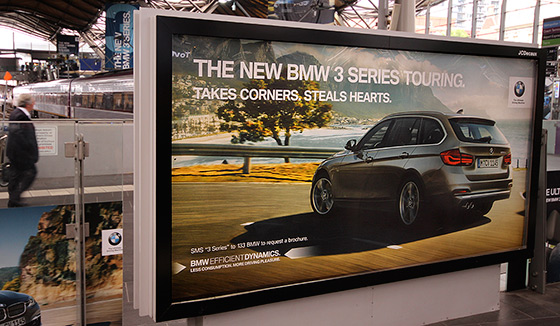
Real estate cheating game
If you haven’t tried buying a house in Australia, I’d hope for you that you won’t ever have to. I certainly can’t recommend the experience. I don’t think I have ever before been acquainted with an entire business sector working on such low business morals. In Australia, buying a house means getting entangled with so many tricks and unfair wrong-doings by sleazy real estate agents and even the solicitors who you’d initially take for granted would be representing you since you had paid a fee for the service. Deceptions and cheating is the name of the game – and seemingly, Australians buy into it and accept that “this is just the way it is when you want to buy a house.”
These are just examples. I could go on. But let’s get to the point: Tackling the kind of climate emergency we now are confronted with is not a ‘cutting corner’-kind of occupation. Cheap, easy solutions and dirty tricks won’t work here.
What drove the global community to this point, where we are now approaching some of the very dangerous climatic tipping points, has quite a bit to do with this ‘cutting corner’ mentality. It has less to do with those monkeys who cheat, and a lot to do with the masses of people who silently accept that this is the way the ball bounces. That cheating and lying is the name of the game, and we have to… well, if not accept it, then at least accept that we have to live with it, whenever we come across it.
Once dishonesty has become the common denominator in the society, then try enter a topic as complex as climate change in the general discussion and see what happens.
Not surprisingly: it gets washed up in a web of lies and misinformation just as ugly as those electricity-wire-webs in which the nation has become entangled.
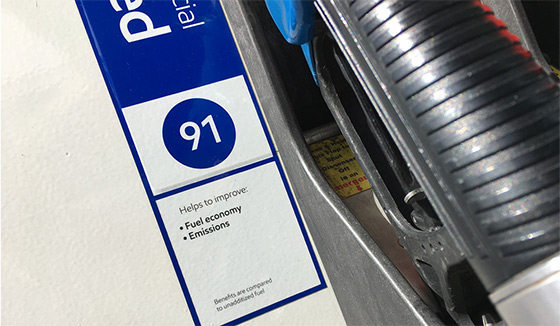
Greenwashing tolerated
Unless you had educated yourself, how would you know, for instance, that when you see a truck full of gas with a huge sign saying ‘Bringing you cleaner energy’, then it means that this truck is in reality ‘Bringing you climate-destroying, air polluting, toxic and explosive fossil fuels’.
Of course, which gas company would want to tell us this? It sounds a lot nicer that something you are trying to sell is “cleaner”. So why not simply write “cleaner”, because we can? No authorities will hold you responsible for the fact that you are deceiving the public.
While happily cashing in on the fossil fuel financed advertising revenue stream, newspapers and tv stations see no reason to hold the fossil fuel companies accountable for their immoral acts.

 In Geelong’s free newspaper The Indy which is distributed to all residents of the city, you will on one page see a full-page advertisement from the local oil refinery, advising us to feel ‘proud’ of them, primarily on the grounds that they “keep Geelong people working,” and then on another page you will see an article advocating for that Geelong should build a new large-scale gas plant to create new jobs.
In Geelong’s free newspaper The Indy which is distributed to all residents of the city, you will on one page see a full-page advertisement from the local oil refinery, advising us to feel ‘proud’ of them, primarily on the grounds that they “keep Geelong people working,” and then on another page you will see an article advocating for that Geelong should build a new large-scale gas plant to create new jobs.
Victoria’s State Government recently announced a permanent ban on drilling for onshore gas. Since then the industry has been claiming that the ban is now going to cause a gas shortage and thus a price rise for consumers. However, when pressed a spokesperson in the industry admitted that there is actually “no physical shortage of gas – just a lack of long-term supply contracts to the Australian domestic market.”
What this means is that the industry is deliberately choosing to export gas from Victoria in order to manufacture a shortage which in turn pushes your gas prices up.
How good is that?
Then all you need is simply use your allies in the media to spread the misinformation that there is a shortage – spread it far and wide, so that everyone will go back to the State Government and complain about the ban on fracking.
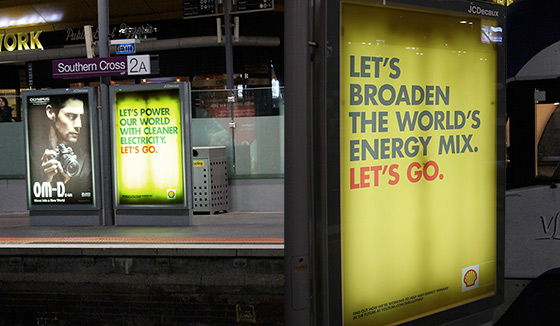
Shell spends huge sums to make us think that they like clean energy, even though the only product they are selling us… is fossil fuels.

But this sort of greenwashing is the least of it. The bill which future generations will pay for the massive pollution of the atmosphere will be measured in lost lives, not in dollars. The current system directly transfers climate damage costs from the carbon polluters to us, the taxpayers.
» Desmog – 31 August 2016:
Canadian Taxpayers Fork Out $3.3 Billion Every Year to Super Profitable Oil Companies
http://www.desmog.ca/2016/08/30/canadian-taxpayers-fork-out-3.3-billion-every-year-super-profitable-oil-companies
Cancer and diseases
All the people in New York have died because of air pollution! You didn’t see the news? No, you haven’t seen it because it hasn’t happened. But more than 7,0000,000 people – the same number of people living in the New York City area – died last year because of air pollution, over half in the poorest countries in Asia.
Air pollution, according to the World Health Organization, causes cancer, cardiovascular and acute respiratory diseases, mainly in women, children and the elderly, and air pollution is a global health crisis that kills more people than malaria and AIDS combined.
We all inhale the nasty smoke particles, and recent detection of ‘abundant’ magnetite particles in our brains raises concerns because of suggested links to Alzheimer’s disease.
» The Guardian – 6 September 2016:
Toxic air pollution particles found in human brains
» RenewEconomy – 29 August 2016:
Carry on polluting: Australia’s useless safeguards mechanism
Deceived – again
Not so long ago, ‘Dieselgate’ broke – the ugly secrets which uncaring corporations such as Volkswagen and ExxonMobil have hidden from us were exposed. Just like Big Tobacco was eventually exposed and also held accountable after more than 40 years of getting away with lying about the relationship between cancer and smoking.
Outraged by the Volkswagen and Exxon scandals, The Sustainable Hour took a look at some local examples of scandalous emissions fraud and mismanagement which takes place – or has taken place – right here in Victoria where “Hazelwood-gate” for instance for some reason has been getting very little attention, and how about the alleged ‘Burnley car tunnel-gate’, the ‘Anglesea power plant’-gate, or the recent gas mining fugitive emissions ‘scientific’ report fraud scandal?
This is an hour’s radio podcast about air pollution and cheating with air quality measurements:
» The Sustainable Hour:
We were being lied to. Victorians still are
In other words: We are being taken for a ride. We know it. But like with the flawed real estate business culture, we shrug our shoulders and move on. “What can we do about it?”
Gas, a toxic fossil fuel, is labelled ‘natural gas’, so that we like it better. And in the news, you will be hearing again and again about ‘natural disasters’. The sad truth is that there is not much ‘natural’ about a climate change disaster or a ‘100-year-flooding’ happening every second year. It is a crime scene – and the climate criminals who are responsible for it all have known faces, names and addresses. They are not working in spooky, dark cellars or hiding in remote mountain ranges. Many of them work in our governments at leading positions. In the spotlight every day. Others work at CEO level in fossil energy and manufacturing companies.
Open the news. Watch. What you are watching is a fossil fuel financed masqerade. You’ll be listening to news readers, meteorologists and politicians talk about flooding dramas, rising gas prices, farmers going bankrupt and similar stories, but none of them will explain to you about the roots of these problems they talk about.
The fossil fuel industry which – along with our political leaders – are responsible for much of the climate-related mess our society is in now, is getting away with murder, literally, while they hide behind a mask of spin, misinformation and lies.
Fossil fuel barons have our governments’ blessing to wilfully destroy our climate while they laugh at us all the way to the bank, and we die from cancer, cardiovascular and acute respiratory diseases caused by their toxic emissions. We die in the millions, annually, around the planet – because we are conveniently accepting living on the lie of theirs which is that if we want energy, there are no alternatives to fossil fuels.
Australians are generally fully aware that they are being made fools of by the fossil fuel industry. The mystery to me is that they accept this. Unless if it is because the ‘cutting corner’-culture has made them numb. They don’t even bother.
What’s worse: consequently, our lawmakers, police investigators and judges also look the other way, allowing the climate criminals to continue their dirty, destructive generation of wealth for themselves. The climate crime now has led humanity to a tipping point where it threatens the very future of our society, of our civilisation. The barons, currently each earning millions of dollars every year, trade their own welfare and luxury with the livelihood and survival of our children and their children.
The coal sector is now in decline. But even if you are losing money, you can still make the big bucks whilst destroying the climate, apparently, as the coal company New Hope recently showed us. They just increased their CEO’s pay to $1.4 million this year despite the company’s net loss more than doubling to $53.4 million. He surely must be laughing all the way to his bank at the moment.
Meanwhile Australia’s big four banks are making a mockery of customers to whom they had given a ‘2°C degree commitment’, promising to align their investment policies with the December 2015 Paris climate change agreement. So do you think they do it? Nah, they just say it, and continue pouring billions of dollars into the fossil fuel sector.
In my wold, that is called lying. Since December 2015, according to Market Forces, the four banks have poured another $5.6 billion into the fossil fuel sector, adding it to the $65 billion they already have invested there during the last eight years.

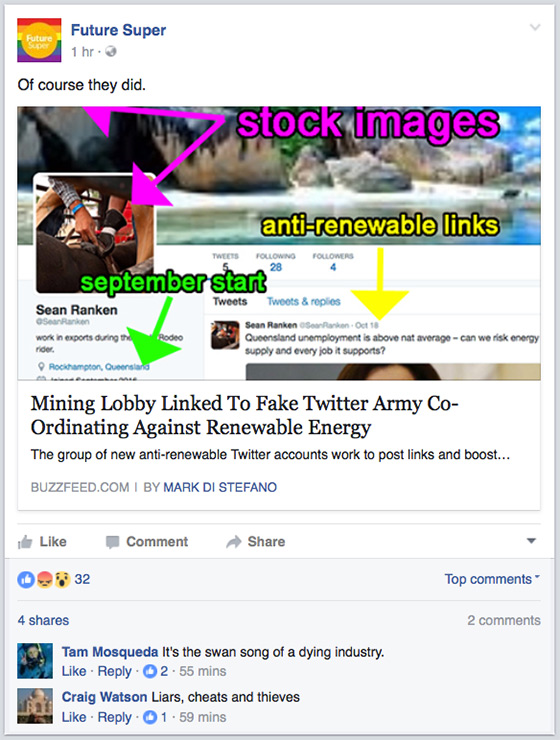
Author and chairman of the Copenhagen Climate Council Tim Flannery pretty much nails it when he describes the issue in this way:
“The biggest problem I think we’ve got is the huge vested interest in the present. No one likes change, and when you’re looking at change at that scale all sorts of special interests get in the way. And those vested interests have a very loud voice.”
This is not just bad. It is the scandal of the century. Knowing the climate threat and the emergency it confronts us with, in a civilised, intelligent society – how can this crime be allowed to continue, year after year?
The scandal is apparently so huge that mainstream media are unable to see it. Or they see it, but deliberately refuse to mention it or dig into it. The few times we have seen a fossil fuel scandal exposed, it was academic researchers and climate action activists who did the work – not the journalists who you would have thought had that kind of activity as their paid job.
» The Sustainable Hour:
Climate misinformation thrives in Australian media
Confusion, contradictions and dishonesty
Our parliamentarian leaders seem – at best – oddly confused. You hear them say one thing, in particular in speeches held at international gatherings, but then they do something else. The Australian nation currently has no credible policy to reduce emissions in the power sector and enable Australia to meet its global climate change commitments.
Some of these politicians are obviously ‘bought’ by the energy industry – some were schooled there and went directly from CEO positions in the industry into politics. However, I reckon the majority of politicians pretty well have understood what is going on here, but for one reason or another choose to keep quiet about it.
Again, the big mystery to me is why a party like Labor, who generally seem like a group of well-educated and civilised people, still don’t have the political courage to show leadership on this issue, as the Greens are doing it.
Worse, I find it bizarre to have to witness conservative Australian politicians go against all of their own conservative values and create new laws that criminalise those who fight for conservation and protection of our old world.
Why would liberals do all they possibly can to suppress new energy technology which gives the individual house owner both a new energy freedom and new wealth, while cleaning our air from pollution? It doesn’t make any common sense, to be honest.
And honesty, I think, is exactly what we need to insist much harder on now. Climate action and and a new culture of honesty must be cultivated together. “Strive for excellence,” and “Aim higher”, as I sometimes see schools use as their slogans.
Climate change is a national security concern, and a question of our personal safety as well. I doubt that the next generation after us is also going to passively accept that those who commit climate-damaging crimes are not being held accountable. That people spread lies and misinformation without any consequences for them whatsoever.
There is an important legal development that could be – or could become – relevant for us all who are concerned about the climate and environmental crimes. On 15 September, the UN-backed International Criminal Court (ICC) in The Hague announced that it will in future prioritise crimes that result in the “destruction of the environment” and the “exploitation of natural resources”.
“In change of focus, Hague court will prosecute government and individuals for environmental crimes…”.
» The Guardian – 15 September 2016:
ICC widens remit to include environmental destruction cases
In an interview in the radio show The Sustainable Hour on 94.7 The Pulse, Dan Cowdell from Reenergise Geelong told listeners that one of the top barriers to getting solar on the roof is lack of trust. People hold back because they don’t know which installers are actually trustworthy. Who can I trust with the information about how big a system I need? Who should I be listening to? The solar industry in Australia allegedly has a history of companies that appear out of nowhere, slap some cheap systems on the roof really quick, and then, the next thing, that company is gone, or has reopened under a new name. So there are some real reasons why Australians have issues with trust.
What I have also observed is that Australians generally acknowledge that the national tradition of cutting corners, using ‘weasel words’, cheating and choosing the easy way out is a real problem in this country. It has reached a point where people in other parts of the world would term it highly problematic because of its low and slack business morals.
Dishonesty and cutting-corner-culture is a problem, Australia will have to tackle as it turns into a more sustainable, carbon-free society. We need to work out what can create a culture of trust and honesty. Not just for the sake of the climate, but really because this – according to researchers – is important if we want to improve our quality of life. On the road getting there, we will have to evaluate these cultural issues and traditions for how things are done. They must be openly debated, weighted and measured, researched and explored.
I invite you to join me on that journey. It begins right here and now.
“A society built on the narrow definition of self-interest we have today is not capable of meeting the big challenges of our time.”
Tosh Szatow co-founder and director of the Melbourne-based company Energy for the People
South Australian storm puts dishonesty issue on the edge
I started this blogpost writing about electricity poles and wires. What’s also a part of that story is that they are not just ugly and dangerous, they also make Australians extra vulnerable to climate change.
As these lines were written, Australians witnessed a most bizarre and disgustingly dishonest anti-renewables stunt performed by their leaders, the Australian government, trying to fool everyone by turning the climate calamity in South Australia into… not a call for more renewables, as one would logically expect, but the exact opposite: yet another attack on the renewable energy.
The irony of it being that the only South Australian homes which didn’t experience any black-out were those running off-the-grid on renewable energy and batteries, while the sheer power of 80,000 lightning strikes and severe winds took down 21 transmission towers, forcing the shutdown of South Australia from the national grid.
This is at the same time brilliant example of exactly what this blogpost has been an attempt to question: Why is it commonly accepted in Australia that politicians and high-profile media personalities manipulate and misinform in order to promote their own anti-renewables agenda? How can this be considered acceptable at a time when the world is in a deep crisis over climate disruptions caused by our greenhouse gas emissions?
In his response to the situation in South Australia, after it was hit by what was called a “once-in-50-years-storm” and the major power black-out, Prime Minister Malcolm Turnbull, for instance, said:
“I regret to say that a number of the state Labor governments have over the years set priorities and renewable targets that are extremely aggressive, extremely unrealistic, and have paid little or no attention to energy security. Its not just focused on South Australia, but the same observation can be made about Queensland or indeed Victoria.”
Media was quick to follow up with similar nonsense. For instance, Financial Times wrote an editorial with the headline: ‘Time to rethink rush to renewables’.
The Victorian Premier Daniel Andrews, however, told ABC RN quite bluntly what he thought about the Prime Minister’s statement:
“No one supports more of our power being generated by renewable means than me. I want the investment and the jobs, and frankly the climate change leadership that comes with that. But I must say that the Prime Minister has gone off to a very very shaky start, peddling ignorant rubbish, lecturing people about things he knows nothing about, and conflating an extreme weather event – more of which we will see if we don’t get this right – with an ideological… well, I don’t know – is he a supporter of renewable energy? It seems Tony Abbott is back.”
Andrews’ Government sent out a media release which furthermore said:
“Rather than peddle mistruths, Malcolm Turnbull and Barnaby Joyce should start providing some national leadership and focus on developing a renewable vision beyond 2020. With thousands of people still without power, as Prime Minister Malcolm Turnbull should be supporting the South Australian community instead of trying to score cheap political points.”
To understand where the truth lies in all of this, I’d in particular recommend to read Dr. Binoy Kampmark’s short article: Demonising wind energy in Australia: The South Australian blackout, which basically explains what really happened, and that a report from the National Energy Market Operator has confirmed that the blackout had nothing to do with whether the state was powered by wind or something else. In other words: The Prime Minister and his ministers were spreding these lies simply to put wind energy in a bad light.
And here is a speech by Ross Garnaut, who knows what he is talking about, but that is a longer read.
2017 UPDATE
Half a year later, a part of the truth finally came out:
"AEMO told political advisers that renewable energy was not to blame for blackout
Didn't suit agenda https://t.co/IJ9TnlfpN0
— Belinda Barnet (@manjusrii) February 12, 2017
» The Guardian – 13 February 2017:
Turnbull ignored advice that renewable energy not to blame for SA blackouts
Coalition statements blaming the blackouts that hit South Australia last year on wind power were made despite official advice that storms were the cause
Reactions
These were some of the numerous reactions on social media around October 2016:
Weasel words like "energy security" in high rotation now Turnbull has been slammed for anti-renewables spin #auspol https://t.co/HTiwT3Xj1W
— Yes 2 Renewables (@Yes2Renewables) October 2, 2016
Mmm, who to believe: One Nation, Malcolm Turnbull & Nick Xenophon? Or the guy who runs the country's electricity network? pic.twitter.com/12aGgYx03D
— Adam Bandt (@AdamBandt) September 29, 2016
Absurd attacks on renewables gets ppl asking where @JoshFrydenberg's interests really lie #auspol #DefendRenewables pic.twitter.com/90NpUyzf3z
— Yes 2 Renewables (@Yes2Renewables) October 3, 2016
» Letters in The Age also showed the Federal Government’s misleading attempts to blame renewables for the storm in South Australia didn’t wash.
“Despite a concerted effort to create a panic about renewable energy following the South Australian storm, public support for ambitious renewable energy targets remains high.”
Peter Lewis in The Guardian: Sorry, shock jocks, but the public isn’t buying into a renewable energy panic
» #StuffWeCanBlameOnRenewables
“When South Australia’s electricity grid went down on September 28 after a massive storm, there were no problems at John and Elizabeth Heij’s home at Aldinga south of Adelaide. Their hybrid grid-connected solar with battery storage system meant they had power through the 12 hours of the blackout in their area.”
» ATA – 10 October 2016:
Couple beats SA outage with solar battery storage
“The Bureau of Meteorology says wind gusts up to 260km/h from a “supercell” thunderstorm and multiple tornadoes were recorded on September 28, destroying transmission towers and causing the state-wide blackout in South Australia.”
» RenewEconomy:
Bureau of Meteorology says 260km/h winds knocked down network in S.A. blackout
A good summary of the present situation by The Age’s Adam Morton:
» The Age – 6 October 2016:
What’s really going wrong with electricity?
“Exactly the wrong conclusions”
Former Shell CEO Ian Dunlop wrote in Financial Review:
“Your editorial draws exactly the wrong conclusions from the SA power outages. Rather than slow down the transition to a low-carbon energy system, it must be accelerated if we want to create a sustainable, growing economy. Global warming almost certainly played a significant role in the SA event.
It is high time that the incumbency accepted the science, and the dangerous implications of warming even at the one degree already experienced relative to pre-industrial conditions, let alone the further one to two degrees, which is already locked into the global climate system by virtue of historic carbon emissions.
To avoid the escalating risk of really catastrophic climate impacts and the social chaos which will follow, there is no alternative but to now implement an emergency response, akin to wartime. This is not alarmism, but an honest appraisal of the science and evidence before us.
The irony is that this transition opens up the greatest investment opportunity the world has ever seen. Australia is better placed to prosper in a low-carbon world than virtually any other country, provided we choose to take up the challenge. But it requires real leadership and innovation, encompassing a serious price on carbon, genuine support for science, removal of fossil-fuel subsidies and much more currently deemed to be ‘politically unrealistic’.”
“Mr Turnbull, there has never been a better time to change to renewable energy.”
Rod Duncan
“The more that electricity is generated and used close to the source, the less we need to rely on large and expensive transmission lines like those destroyed in South Australia’s recent megastorm.”
Nicky Ison, in The Courier: Power to communities embracing micro-grids
Examples of headlines in the Herald Sun and The Australian
(the articles are for subscribers only)
» The Herald Sun – Andrew Bolt:
South Australian blackout puts questions on value of wind power
“It was three years ago that I advised South Australia’s Liberal leader to get himself a stick of gelignite and blow up a wind generator.”
» Weekend Australian – Chris Kenny:
SA blackout shows need for energy security instead of windmills
“By plunging itself into darkness and flailing itself with prohibitive, self-imposed electricity costs, South Australia provides the nation with a critical warning about energy policy. It also demonstrates how our political and media debate has been complicit in this damaging delusion.”
» Weekend Australian – Graham Lloyd:
Energy security: Peter Beattie, like Jay Weatherill, learned the hard way
“South Australia’s statewide blackout underscores that more and better infrastructure is needed to cope with intermittent energy such as wind and solar.”
» Herald Sun:
No to coal: how SA Labor killed reliable power supply
“A new letter shows how South Australia’s Labor government, maddened by its global warming religion, refused a deal to save its last coal-fired power station. Result: electricity bills shot up and the whole state lost its power.”
Examples of sponsored posts by ‘Australian Energy Forum’
» See more posts on www.facebook.com/aussiejobdestroyers and www.facebook.com/Securing-Australias-Energy
Examples of sponsored posts by ‘The Global Warming Policy Forum’
Cheating on Twitter
As renewables become more and more affordable, corporations that profit from fossil fuels are desperately trying to tarnish the reputation of clean energy.
Buzzfeed revealed dozens of fake Twitter accounts set up to post anti-renewable rants in the wake of the South Australian storm. Turns out their identities – like their facts – are completely made up, with phoney display pics and all. And guess which two accounts they all link to?
1) The cashed-up Chamber of Minerals and Energy of WA (a pro-mining lobby group)
2) A Bangladesh-based marketer who sells “forum posting, content writing… and so on” online
“This is just the tip of the iceberg,” writes GetUp: “The big polluter lobby spends millions every year trying to hold back the transition to renewable energy.”
» Independent Australia – 16 December 2016:
Media Sauce: What’s wrong with journalism today?
By Martin Hirst
» Independent Australia – 21 December 2016:
ICAC, Obeid and the criminality that is Australian politics
By John Passant
That said, there is also another aspect that should be included in this story about the South Australian black-out:
In the 1990s, the first PCs and Macs had many ‘childhood diseases’. One of them was that they often crashed. And while this was SUPER-annoying, it didn’t hold anyone back from buying them. This meant that the computer companies got money so they could keep improving their products, and eventually became the computers got to be more and more stable.
Something very similar is the case with renewable energy: in the beginning there’s bound to be things we need to learn and things we need to get better at. That does not mean, however, that we – as various politicians and fossil-funded media so wrongly are trying to get us to believe – that we should be reluctant to invest in new technology and in renewable energies – on the contrary!
There has never been a better argument for that we must invest everything in renewable energy. Because as the development of computers and mobile phones have shown, it is precisely in this way that we help these technologies become better and better – and more and more reliable.
Other blogposts in this series
» 26 September 2016:
Benefits from understanding the connection between climate and mental health
» 29 August 2016:
Let’s meet and greet our local climate sceptics with confidence – and a smile
» 29 August 2016:
What’s Geelong’s future? Here’s inspiration from Denmark
» 29 June 2015:
The Tonystralian paradox
» More…
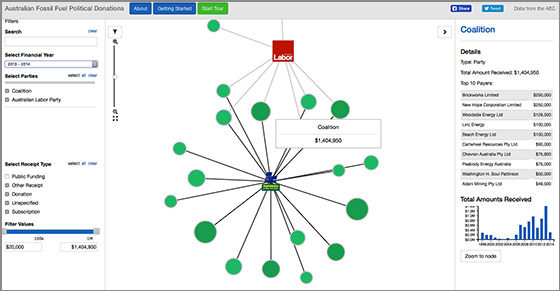
Interactive map by 350.org shows how the fossil fuel industry’s donations to major parties drive climate inaction
» Read more on 350.org.au
Crisis easily exploited
On the morning after Britain voted to leave the EU, the novelist Philip Pullman tweeted:
‘We had a headache, so we shot our foot off. Now we can’t walk, and we still have the headache.’
François Matarasso commented: “This image seemed to catch something important about the world we’re living in. We face grave problems – everyone knows that – but we and, more importantly, our leaders, often seem confused about what those problems are. Without a clear understanding of the actual challenges that face us, we thrash about in pain and fear and choose bad solutions. In our distress and confusion, we do not respond: we react. We lash out and put a bullet in our foot.
At moments like this, it is important to remember that we have survived bad times before. I say this to put today’s crises of civil war, terrorism, climate change and economic failure into context, not to minimise them. Their consequences, like the refugee crisis, are easily seen and – unhappily – easily exploited. We can all react to these terrible pressures but responding to them in a way that might make a difference – that requires more thought, more empathy, more imagination. It requires, I might say, more creativity.
The main difference between today’s crises and those of the world in which I grew up is complexity. Equip us with ideas, skills, confidence, knowledge, insight, organisation and we shall be empowered to face the crisis which is escalating in front of our eyes.
Art does not change the world. But it does change the people who change the world.”
» Read more by François Matarasso on www.parliamentofdreams.com
Pope: boycott the fossil fuel companies
The consequences of climate change, says Pope Francis in ‘Laudato Si’, “we can no longer sweep under our carpet.” The Pope’s intensified his message in September 2016 when he suggested that we must begin to boycott the fossil fuel companies.
» Climate Change News – 1 September 2016:
Vatican urges boycott of environmental polluters
“From tree-planting to boycotts, people of faith should do their bit to protect creation, says spiritual leader of world’s 1.2 billion Catholics.”
American Geophysical Union receives funding from Exxon
The United States is rich with examples of how the general public is being deceived and betrayed by greedy, stubborn people who refuse to change, even though it is an established scientific fact that we have to.
The American Geophysical Union (AGU) is the largest association of Earth scientists in the world and a well-respected institution that advances public understanding of science. Yet, the AGU continues to accept funding from Exxon, one of the world’s leading funders of climate change denial.
Exxon has been deceiving the public about the science of climate change for decades and funding climate disinformation at a massive scale. The AGU’s own sponsorship policy forbids accepting funding from any organisation that supports science misinformation, a rule that was put in place for good reason.
It’s time for the AGU to start abiding by its own policy — starting with Exxon.
Yet, the AGU Board couldn’t be convinced at their last meeting and decided to continue accepting funding from Exxon. It took a letter from U.S. Senator Sheldon Whitehouse and Representative Ted Lieu to push the AGU Board to vow to once again “review and discuss the information”.
Over 300 Earth scientists have signed on to an open letter calling on the AGU to reject Exxon sponsorship. Signers include renowned climatologists James E. Hansen, the former director of NASA Goddard Institute for Space Studies, and Michael E. Mann, Director of the Earth System Science Center at Pennsylvania State University.
» ClimateTruth.org – an organisation which fights the denial, distortion and disinformation that block bold action on climate change – wants to hold the AGU accountable and asks you to stand shoulder-to-shoulder with these scientists and 50,000 citizens by adding your name.
Read more:
» The Guardian – 22 February 2016:
Climate experts urge leading scientists’ association: reject Exxon sponsorship
» InsideClimate News – 26 June 2016:
Exxon’s Donations and Ties to American Geophysical Union Are Larger and Deeper Than Previously Recognized
» The Natural History Museum – 6 May 2016:
Scientists to AGU: Drop Exxon Sponsorship
» American Geophysical Union – March 2016:
Organizational Support Policy
» Report – February 2016:
Ending ExxonMobil Sponsorship of the American Geophysical Union
» ClimateTruth.org on Twitter and Facebook.
Dig deeper
Watch independent documentaries and read the literature which shines a bright light on these subjects. For instance:
• Merchants of Doubt
• Who Killed the Electric Car
• Revenge of the Electric Car
• The Cove
• Sharkwater
• Blackfish
• Gasland
• Gasland 2
• The 11th Hour
• An Inconvenient Truth
• Racing Extinction
• Food Inc.
• Unstoppable
• The Road Not Taken
• The War on Science
• The Madhouse Effect
• Censoring Science

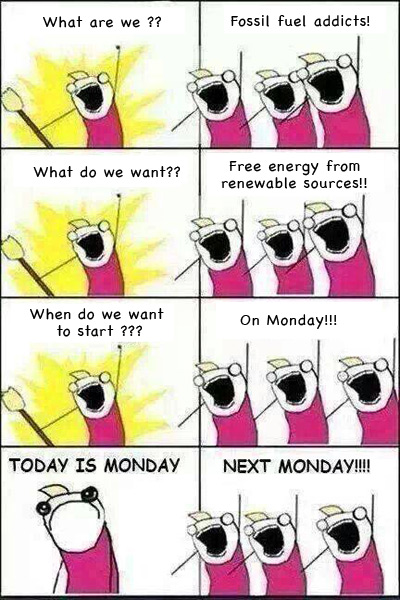




They say TRUTH is the first casualty of war and it would seem that truth is the first casualty of the south Australian power outage.
As the truth has gone there is no possibility of a real solution.
The only certainty is nature; more global warming = more storms = more power outages.
The solution = less CO2
The method = more renewable energy or carbon capture and storage (CCS) and stay with fossil fuels.
If the federal government does not like wind energy then cough up the hundreds of billions for carbon capture and storage.
I am afraid to say Mik is right. Truth is out the window, and the general acceptance of lies is a major problem. It’s ironic that neoliberal ideology that nearly every politician supports pushes responsibility onto the individual even when is plainly a system failure EXCEPT the responsibility to criticise and point out political lies and “spin”. It’s got to the stage where the politicians want to stop citizens criticising projects on environmental grounds .
The main stream media are in on the spin. They generally turn a blind eye to blatant lies; probably thinking of maintaining their income rather doing their job.
There have been good politicians. The English politician Tony Benn was one.
Quentin Farmar-bowers